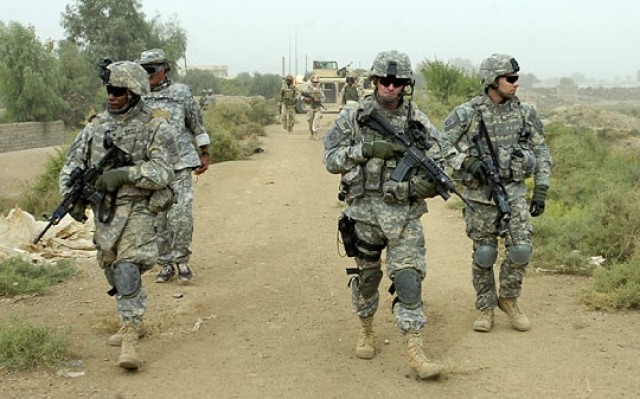
Iraqi Army soldiers discovered multiple weapons caches during joint patrols with paratroopers from Company D, 2nd Battalion, 505th Parachute Infantry Regiment, 82nd Airborne Division, Oct. 21-22, in a village north of Samarra, Iraq.
Iraqi Army soldiers from 2nd Company, 1st Battalion, 1st Brigade, 4th Iraqi Army Division, were patrolling fields outside the village when they came across five 130mm artillery rounds hidden in a hole. The Iraqis reported the find to their paratrooper counterparts, which lead to a second, more thorough, search of the area.
One cache after another - each containing an assortment of munitions - was discovered throughout the countryside surrounding the village, said Capt. Brian Roeder, Company D commander.
The weapons caches included 60mm and 80mm mortar rounds, 130mm and 155mm artillery rounds, grenades and rocket-propelled grenade launchers.
Additionally, four of the 155mm mortar rounds were found rigged to explosives and ready for emplacement and detonation.
Approximately 240 mortar rounds were found during the searches, leading Sgt. 1st Class Miguel Antonio Ramirez, 4th platoon's sergeant, and his troops to believe that his men have put a significant dent in the production of improvised-explosive devices in that area.
After finding the surplus of weaponry, the troops questioned nearby villagers, which led to the detainment of three individuals, including one bomb maker.
Credit to the detainment of the bomb maker belongs to his own brother, an Iraqi soldier who serves with 2nd Company.
The Iraqi soldier informed the paratroopers of his crooked brother's profession as a bomb maker.
With the aid of their Iraqi Army counterparts, the paratroopers of Company D are charged with being the most successful company within the 3rd Brigade Combat Team in terms of numbers of insurgents and munitions seized, said Ramirez.
Being the smallest company in the battalion, Roeder said it feels good to be producing the greatest results.
"We have had success as a company. We went beyond catching the trigger man and going straight to the source. These guys are going to have a hard time replacing the rounds we pulled," said Roeder.
Ramirez added that if it were not for the intelligence received from the Iraqi Forces, discovery of munitions caches and the detainment of suspected insurgents would be more difficult.
When Roeder and his men first arrived to support joint-combat operations in the Salah ad Din Province, he noticed that the Iraqi forces had little to no motivation to do their job and complete their mission.
However, over the past two months drastic improvements have been made in the way the Iraqi Army is handling combat operations in their sector, said 1st Lt. Zachary Kaye, platoon leader.
"They're definitely starting to hold their own in this area," said Kaye. "You see them actively patrolling at least two to three times a day; they're setting up check points on their own; they're getting information from the local population on improvised-explosive device positions and information on the location of suspected insurgents."
"I have a feeling that it won't be long before the Iraqi Army assumes full responsibility of the area between Samarra and Tikrit," said Ramirez.

Social Sharing